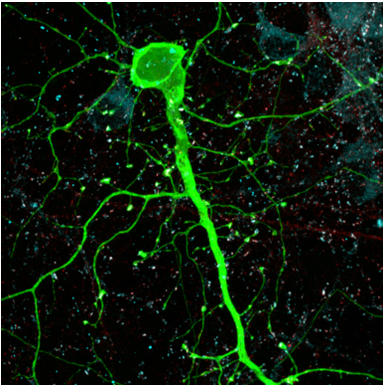-

Northwestern Medicine Caregivers Practice Having Difficult Conversations
Frontline caregivers practiced breaking bad news to simulated patients in an interactive workshop broadcast from Feinberg’s Simulation Lab to four other Northwestern Medicine locations.
-

Novel Approach Offers New Insights Into HIV’s Lifecycle
Northwestern Medicine scientists have developed a novel method of tracking HIV infection, allowing the behavior of individual virions to be connected to infectivity.
-

Medical Students Get First Taste of Patient Care
First-year medical students shadowed a wide variety of medical professionals, part of Introduction to the Profession week.
-

Sleep Patterns Contribute to Racial Differences in Disease Risk
Poor sleep may be a significant factor driving the differences in risk of cardiometabolic disease between African-Americans and European-Americans, according to a new study.
-

Active Non-Coding DNA May Help Pinpoint Genetic Risk for Psychiatric Disorders
Northwestern Medicine scientists have demonstrated a new method that helps to pinpoint which genetic variants might be most important in the development of schizophrenia and related disorders.
-

Incoming Medical Students Celebrate Founders’ Day
Founders’ Day, an annual Feinberg tradition, welcomed the incoming class of first-year medical students and marked the official beginning of the school year.
-

Med School Curriculum Kicks Off With a Patient’s Story
As part of medical students’ Introduction to the Profession week, rapper and motivational speaker David Rush opened up to first-year medical students about his experiences during treatment for kidney disease.
-

Scientists Identify Mutations in Venous Valve Disease
Mutations in the genes FOXC2 and GJC2 are associated with defects in venous valves, according to a new study published in the Journal of Experimental Medicine.
-

Northwestern Hospitals Among the Best in Latest U.S. News Rankings
U.S. News & World Report recognized three Northwestern Medicine hospitals in its 2017-18 rankings of America’s Best Hospitals. The Shirley Ryan AbilityLab once again earned the top spot among rehabilitation hospitals in the country, and Lurie Children’s ranked first among children’s hospitals in Illinois.
-

Surgical Residents Adapting to Flexible Shift Hours
Karl Bilimoria, MD, MS, associate professor of Surgery, found growing acceptance of new flexible shift lengths in a national survey of surgical residents.
-

Medical Student Heads to India to Assess Management and Cardiac Care
Fourth-year medical student Kyle Yoo has been selected as a Fogarty Global Health Fellow and will travel to Kerala, India to study the interplay between management practices and acute cardiac care.
-

Assessing the Accuracy of Cardiovascular Data in Electronic Health Records
Northwestern Medicine investigators identified key areas of agreement and disagreement between cardiovascular data collected from electronic health records and data gathered in a traditional cohort study.
-

Genetic Risk for Lupus Tied to Ancestry
A Northwestern Medicine study analyzing the genomes of more than 27,000 individuals has uncovered that ethnic disparities in lupus diagnoses have a genetic basis.
-

Scientists Discover Neural Link Between Generosity and Happiness
A new study published in Nature Communications finds that practicing generosity activates an area of the brain associated with reward and happiness.
-

Investigating the Role Visual Perception Plays in Autism Spectrum Disorder
Kritika Nayar, a fourth-year student in the Clinical Psychology PhD Program, studies visual perception and its role in autism spectrum disorder in the laboratory of Molly Losh, PhD, associate professor of Psychiatry and Behavioral Sciences.
-

Precision Medicine for “All of Us”
Northwestern will play a key role in “All of Us,” a groundbreaking national research effort to gather data from one million or more people in order to advance precision medicine.
-

New Insights Into Protein’s Role in Inflammatory Response
A protein called POP2 inhibits a key inflammatory pathway, calming the body’s inflammatory response before it can become destructive, Northwestern Medicine scientists have found.
-

Reversing Fetal Alcohol Damage After Birth
Two commonly used drugs erased the learning and memory deficits caused by fetal alcohol exposure when the drugs were given after birth, according to a new study.
-

How Babies’ Environments Lead to Poor Health Later
Northwestern scientists have found that nutritional, microbial and psychosocial exposures early in infant development predict DNA methylation later in life.
-

New Technology to Manipulate Cells Could One Day Help Treat Parkinson’s, Arthritis, Other Diseases
A synthetic material developed at Northwestern Medicine could direct a patient’s existing cells to transform into stem cells, creating a new treatment path for stem cell therapy.






